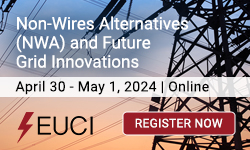The program is designed to assess various Non-Wires Alternatives (NWAs) projects and technologies. It will explore their market and regulatory drivers, challenges, overall resource value, and strategies for grid deployment.
Join us for this virtual conference that spotlights the potential of non-wires alternatives, focusing on their capacity to reduce costs and emissions, and learn best practices for NWA implementation and revenue generation strategies.
Learning Outcomes
- Get equipped with knowledge of visionary non-wires alternatives (NWA) strategies, trends, benefits, challenges, and implementation best practices for resilient energy distribution systems
- Explore cost-effective and reliable solutions that challenge traditional wire-based systems
- Discover how NWA technologies provide sustainable and efficient alternatives
- Discuss insights into evaluating and sourcing various distributed energy resources, considering factors such as cost, reliability, and scalability
- Review integrating behind-the-meter solar and storage solutions within virtual power plants to enhance energy resilience and efficiency
- Attain the latest information on leveraging microgrid technologies to alleviate grid congestion, manage peak demands, and optimize energy storage solutions effectively
- Analyze a ConEd case study and delve into the legal and contractual complexities associated with implementing non-wires alternatives in energy distribution projects
- Evaluate Central Hudson’s Equity in Distributed Energy Sources (DER) program
- Elucidate DTE and Energy Sciences’ three-year geo-targeted pilot program’s intricacies, to achieve cost-effective peak load reductions and defer significant capital investments in the Commercial and Industrial (C&I) sector
- Explore innovative NWA strategies specifically tailored to address challenges and optimize solutions for electric vehicle charging infrastructure.
- Identify strategies for further beneficial electrification






